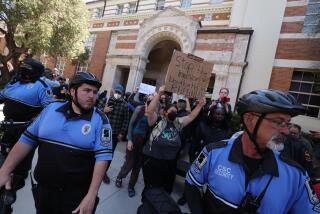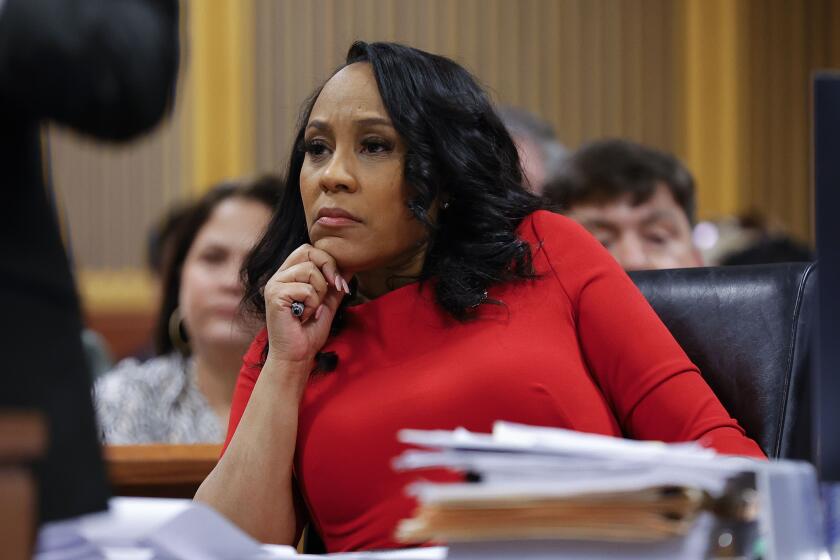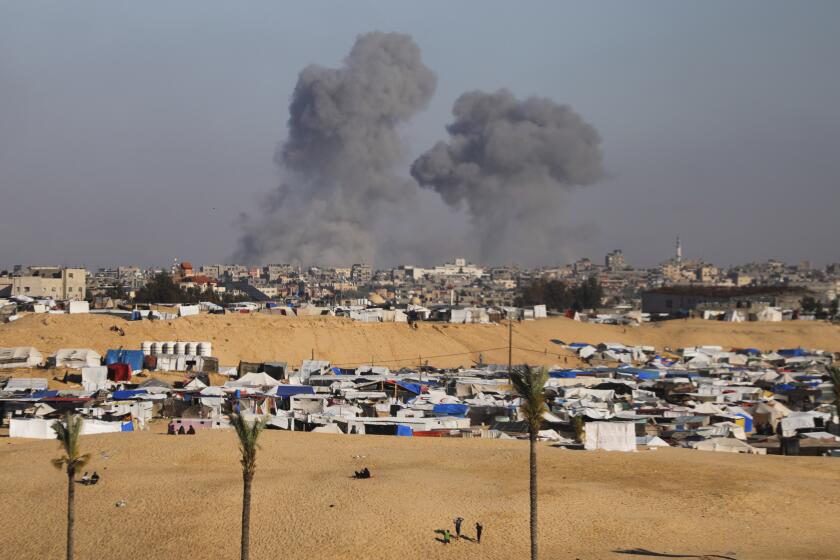Riordan Analyzes Roots of Police Scandal
Los Angeles Mayor Richard Riordan delivered his most significant speech ever on the Rampart police scandal Wednesday, admitting that managerial and political failures contributed to the crisis but defending ongoing efforts to clean it up.
Riordan has discussed Rampart on many occasions, but Wednesday marked the first time he confronted the public’s questions face to face. The mayor faced a number of inquiries about his resistance to the appointment of an independent commission to investigate the scandal--and at one point was challenged by an aggressive heckler.
Riordan, however, held his own as the heckler demanded: “When are you going to accept responsibility?”
Over a smattering of applause, the mayor calmly replied: “The public is holding me responsible and accountable.”
The speech was delivered to the prestigious forum Town Hall Los Angeles and given to a tough crowd. The audience included not just a couple of hecklers, but also a significant number of LAPD critics, including Police Protective League President Ted Hunt and former Police Commission President Stanley Sheinbaum. Although Riordan has been widely criticized inside City Hall for his handling of the scandal, a recent Times poll found him to be enormously popular with the public.
As he analyzed the causes and effects of the scandal, in which more than 30 LAPD officers have been accused of wrongdoing and four have been charged with crimes, the mayor identified three levels of failure that contributed to the crisis.
At the top, he said, were managers who did not hold captains and other LAPD supervisors accountable for their actions; next were mid-level supervisors who he said failed to detect signs of corruption or lawlessness. And finally, there were the officers who lied, framed and brutalized suspects.
All those actions “violated the faith and the trust of the people of Los Angeles,” Riordan said.
Throughout his 20-minute speech and 40 minutes of questions--all of which was broadcast live by KCRW-FM (89.9)--Riordan steadfastly championed Police Chief Bernard C. Parks, whom he appointed in 1997.
The mayor’s support for Parks is nothing new. In one recent address, Riordan called him the best police chief in the world; in another, he asked an audience to join in thanking “dear God” for Parks.
Wednesday, he abandoned those rhetorical flourishes but reiterated his abiding faith in the chief.
Asked about the Police Department’s reputation for nurturing a so-called code of silence, under which officers are reluctant to turn in their colleagues for wrongdoing, Riordan responded: “Certainly, Bernard Parks will not tolerate this. . . . It’s tolerated far less in the Police Department today than in any organization that I know of.”
Riordan added, as he has on other occasions, that Parks has fired more officers in his relatively brief tenure than his two predecessors did in more than a decade. “We have an incredibly tough disciplinarian in Chief Bernard Parks,” Riordan said. “He will not tolerate this type of behavior.”
Whereas the mayor’s support for the chief is unshakable, his backing of the Police Commission, which sets policy for the LAPD and is overseeing its investigation of the scandal, has been more ambiguous. The mayor and some of his commissioners, most notably Commission President Gerald L. Chaleff, have sparred over tactical questions and over the commission’s posture toward Parks.
In his speech Wednesday, however, Riordan gave the civilian panel his unequivocal backing. “Folks, let this commission do its job,” he said. “I’m here today to tell you your Police Commission is doing its job and doing it aggressively.”
In particular, Riordan praised the commission for its appointment of a separate panel that will analyze the Rampart scandal. That panel’s findings will be released to the public and the commission at the same time, preventing its work from being amended by the commissioners. The panel also is operating without any restrictions on its ability to investigate problems or recommend changes. Those assurances, Riordan said, should convince advocates of an outside review of the LAPD that the commission can do that job.
Not everyone agrees. Councilman Joel Wachs, City Atty. James K. Hahn and former state Assembly Speaker Antonio Villaraigosa--all of whom are running for mayor--have endorsed the creation of a panel outside the commission’s auspices. Others, including county Supervisor Zev Yaroslavsky, a possible candidate for mayor, have made the same case.
Indeed, the questions posed to Riordan at the speech demonstrated that he has yet to put that issue to rest. Even after hearing his case for the Police Commission, Sheinbaum, Hunt and several others in the audience complained about what they perceive as Riordan’s inappropriate opposition to a different, independent panel. The mayor did not help his cause by confusing that issue with a related, but distinct one: the decision by some cities to have outside civilian review boards impose discipline on officers who commit misconduct.
Those issues are related but only vaguely, as one applies to officer discipline and the other to who is best suited to analyze the LAPD overall in the context of the current scandal.
Riordan’s aversion to the appointment of an outside panel has received its most notable support from the man who is arguably Los Angeles’ most respected voice on LAPD reform, former Secretary of State Warren M. Christopher. Christopher, who headed the 1991 independent commission that studied the LAPD after the beating of Rodney G. King, recently declined an invitation to form a new panel. Christopher did not rule out such a course altogether, but said he did not believe that it is warranted as long as the Police Commission receives the support and resources it needs to do its job.
While Riordan cites Christopher in support of his position, the mayor has been criticized for the city’s failure to implement some of the reforms that the Christopher Commission recommended nearly 10 years ago.
In fact, Christopher himself in early March dropped his normal reluctance to comment publicly on police matters to express his disappointment at the failure of city leaders to adopt some of his panel’s key recommendations.
“It’s troubling to find that there are matters of real importance that were discussed in our report of nine years ago that remain unaddressed or not fully resolved today,” he said. “The failure of personnel evaluations to give a true picture of officers’ performance; the failure adequately to track and supervise problem officers; and the lack of regular psychological testing of officers are among the items on which I would have hoped to see greater progress.”
Wednesday, Riordan acknowledged that failure but said it was being addressed. “Regrettably, some key recommendations were not implemented,” he said. “They should have been.”
Riordan specifically cited the city’s failure to upgrade its computerized officer-tracking system, a breakdown made more egregious by the fact that the federal government had made money available for just that purpose. Federal authorities investigating the LAPD were infuriated by that discovery and have questioned department officials and others about it.
Riordan did not accept personal responsibility for that failure, attributing it instead to the city’s byzantine bureaucratic machinery. Previously, he has angrily shrugged off the suggestion that he shares any responsibility for that. When The Times revealed the issue in March, Riordan dismissed the article as “typical of the L.A. Times not doing their homework.”
In another area, he conceded that the LAPD is having trouble recruiting officers fast enough to keep up with attrition. If it continues, that problem could threaten federal grant money given to the city to pay for police hiring. Riordan said efforts to streamline the hiring process should help. He added that the LAPD will soon begin giving polygraph tests to all prospective officers, a suggestion raised in the department’s self-analysis of the Rampart scandal. Money for 10 new positions to administer lie detector tests is included in Riordan’s proposed budget for the coming year.
More to Read
Get the L.A. Times Politics newsletter
Deeply reported insights into legislation, politics and policy from Sacramento, Washington and beyond. In your inbox three times per week.
You may occasionally receive promotional content from the Los Angeles Times.







